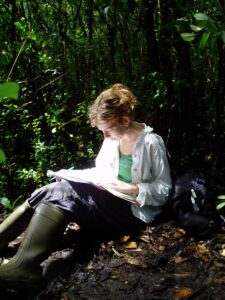
Stacey Tecot: Associate Professor, Anthropology and Director, Laboratory for the Evolutionary Endocrinology of Primates at the University of Arizona
Monday, July 1, 2024,
2:30pm – 3:30pm.
ASA Koffler Great Room, and Zoom
What is it like to be an anthropologist studying lemurs, adorable primates endemic to the island of Madagascar? Are the days spent making novel and thrilling observations in the field? Or is much of the time spent documenting the results? Our speaker, Dr. Stacey Tecot, will provide insights into this field.
In Madagascar, an estimated 98% of the 100 lemur species are threatened with extinction, with most populations in decline. Determining how species mitigate environmental stress to survive and reproduce is critical to an understanding of human and non-human primate evolution and health, and for forecasting the fates of species in the face of climate change and habitat degradation. Since 2000 Stacey has worked with research guides in Madagascar to study wild, red-bellied lemurs in Ranomafana National Park, where she co-directs the Ranomafana Red-Bellied Lemur Project (RRBLP) with Dr. Rachel Jacobs. The goal of the RRBLP is to establish a long-term demographic dataset to track individual reproductive success and population growth/decline over time. She will describe some of her collaborative work using noninvasive methods to collect a combination of detailed behavioral, ecological, and physiological data, with a focus on identifying challenges and solutions to successfully raising offspring in dynamic environments. Her current focus is on the evolution and mechanisms of cooperation, especially cooperative infant care and bonding between individuals and species.
Dr. Tecot holds a BA in Anthropology from the University of Miami, and MA and Ph.D. degrees in Anthropology and Archeology from the University of Texas at Austin. She is an Associate Professor of Anthropology at the University of Arizona, and Director of the Laboratory for the Evolutionary Endocrinology of Primates (LEEP), where new assays are developed to measure noninvasively collected samples, train researchers to analyze their samples, and conduct hormonal assays.
Compiled and Edited by Denice Smith, Academy Village Volunteer
You can connect to Zoom either by using the following URL: https://zoom.us/j/95456511620?pwd=OC9GcnJRNmJpMTdXdXFhaUpCUkx4QT09 or by opening a browser to zoom.com/join and typing in Meeting ID: 954 5651 1620 and Passcode: 85747
